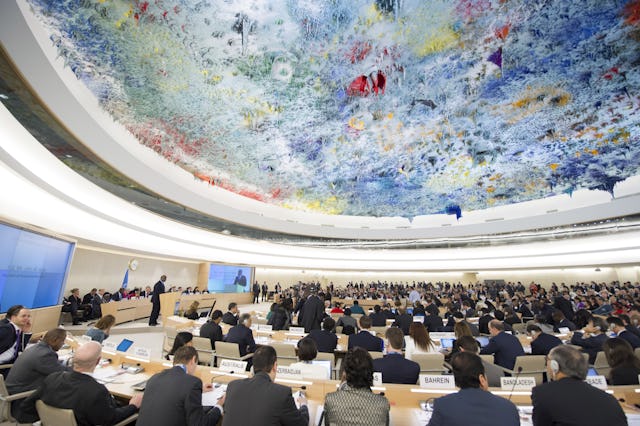Iran's UPR response offers bleak outlook for Baha'is and human rights
GENEVA, Switzerland — Iran's limited and conditional acceptance of just two out of ten recommendations made by other governments about its ongoing persecution of Baha'is today suggests there will be no significant change in government policy in the near future – and a bleak outlook for human rights generally in Iran.
"The sad reality is that Iran has largely refused to accept recommendations made by the international community that it end discrimination against Baha'is, offering instead to the Human Rights Council only token concessions on the issue," said Diane Ala'i, the representative of the Baha'i International Community to the United Nations in Geneva.
She noted that Iran gave only partial acceptance to two recommendations that specifically mentioned Baha'is in its response to October's Universal Periodic Review at the Council, rejecting completely the other eight.
"Other governments in October offered some very strong and significant recommendations about how Iran could end its systematic persecution of Baha'is, but Iran has walked away from them almost entirely, accepting only two in a limited and conditional manner," said Ms. Ala'i.
"Based on this – and their past record of failure to live up to recommendations made at the 2010 UPR – we doubt there will be any improvement in the near future for Baha'is, who are persecuted in Iran solely for their religious beliefs," said Ms. Ala'i.
In a statement read today to the Council, Ms. Ala'i observed that during the October UPR, "Mr. Javad Larijani, the head of the delegation, claimed that Baha'is 'are dealt (with) under the so called citizenship contract' and 'enjoy all the privileges of any citizen in Iran,' and that 'they have professors at the university' and 'students at the university.'
"But recently Ayatollah Bojnourdi, who was one of the drafters of the Charter for Citizenship Rights, publicly said: 'We never say that Baha'is have the right to education; Baha'is don't even have citizenship rights!'
"This is the sad truth of the reality in Iran," Ms. Ala'i told the Council.
Ms. Ala'i expressed the hope that, in its desire to prove to the world its oft-stated respect for the Universal Periodic Review, Iran will begin with the easy step of allowing Baha'is unrestrained access to higher education, a development that would be in line with the two recommendations it has partially accepted.
What Iran accepted and rejected today
At Iran's formal UPR session in October, other governments made 291 recommendations about how Iran might improve its human rights record. At its outcome session today, Iran accepted 130 of those. It gave partial acceptance to 59 of them, and it rejected completely 102 of them. Of those that mention Baha'is, two fell into the partial acceptance category, one from Chile and one from the Czech Republic. They were:
138.111. Adopt provisions to prevent all forms of discrimination against women and girls and, in particular, promote access to higher education for members of the Baha'i community and other religious minorities (Chile);
138.131. Review its legislation and policy so as to ensure freedom of religion of persons belonging to religious minorities, including Baha'i, as well as protection of their other human rights without any discrimination (Czech Republic);
Their partial acceptance, however, was conditioned by Iran's statement "that full implementation of some of these recommendations is contrary to our constitution, basic laws and Islamic values" and "the course of action required to amend current laws need time and lengthy deliberations among different constituent parts in the legislative process."
The eight recommendations regarding Baha'is which were rejected are as follows:
138.125. Put an end to acts of repression against ethnic and religious minorities, in particular Baha'is, and take effective measures to put an end to discriminatory policies against them (Luxembourg);
138.126. Eliminate reported discrimination against religious minorities such as the Baha'is and offer better legal protection to such communities (Sierra Leone);
138.128. Take measures to ensure non-discrimination in law and in practice against ethnic and religious minorities, including arbitrary detention and exclusion from higher education and government employment, as well as governmental interference in private employment, against persons belonging to the Baha'i community (Sweden);
138.129. Cease all discrimination against members of religious and ethnic minorities, including Baha'is, Dervishes, Christians, Ahwazi Arabs, Balochs and Kurds, and ensure respect for freedom of religion (Australia);
138.130. End discrimination in law and practice against all religious and ethnic minorities such as Baha'is, Sufis, Kurds and Sunni Arabs, and ensure full protection of their rights (Austria);
138.132. Put an end to discrimination and repression against people because of their ethnic and religious affiliation, including Baha'is, Kurds, Ahwazis and Christians (France);
138.133. End discrimination in law and practice against religious and ethnic minorities, including the Baha'i community (Lithuania);
138.134. Take steps to prevent discrimination and incitement to hatred against the Baha'i or any other ethnic or religious minority, regardless of whether it is officially recognized (Mexico).
